《本杰明_巴顿奇事》(英文版)作者:菲茨杰拉德
本杰明巴顿奇事
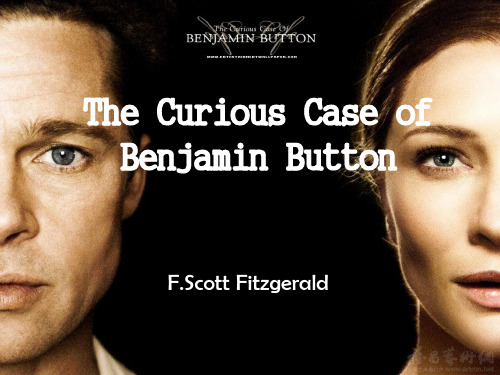
(September 24, 1896 – December 21, 1940)
was an American author of novels and short stories, whose works are the paradigm writings of the Jazz Age, a term he coined himself. Fitzgerald is considered a member of the "Lost Generation" of the 1920s.
•Lost Generation was the generation, that came of age
during World War I. •They considered themselves lost because their inherited values could not operate in the postwar world
Classical sentences
Going home in the phaeton just before the crack of dawn , when the first bee were humming and the fading moon glimmered in the cool dew , Benjamin knew vaguely that his father was discussing wholesale hardware.
The Curious Case of Benjamin Button
F.Scott Fitzgerald
The Curious Case of Benjamin Button
【最新】本杰明巴顿奇事影评-优秀word范文 (8页)

本文部分内容来自网络整理,本司不为其真实性负责,如有异议或侵权请及时联系,本司将立即删除!== 本文为word格式,下载后可方便编辑和修改! ==本杰明巴顿奇事影评本杰明巴顿奇事影评(一)影片《本杰明·巴顿奇事》(The Curious Caseof Benjamin Button)改编自美国作家菲茨杰拉德的同名短篇小说,但本片与原著所要表达的思想内涵以及所涉及的文化视界部相差甚远。
原著中,刚出生的本杰明有着70岁老人的心志和容貌,并随着时间的流逝,心理和生理都出现了逆生长。
本杰明被周遭的人视为不祥的怪物遭到厌恶和鄙视18岁考上耶鲁大学却因50岁的容貌被拒之门外;参加社交场合被错认作是父亲的兄弟,与看上去至少比自己小30岁的女孩结婚,并看着妻子慢慢变老,被儿子逼迫在外人面前称其为“叔叔”,与孙子一起在幼儿园里玩耍,最后在保姆的怀抱里停止了呼吸。
菲茨杰拉德被称作“爵士乐时代”的桂冠涛人,是美国文学史上“迷惘的一代”的代表作家,他兼备了涛人的敏锐和戏剧家的想象力,擅长用个性化的文字讽刺着美国那个特殊的年代里的种种社会现实。
此篇小说其实就是以荒诞的手法折射了人性的自私与人情的冷漠。
而由大卫·芬奇执导的这部同名影片,则完全舍弃了原著中的讽刺意味,他不仅重新编排了这个荒诞的故事,而且跳脱了以往作品的悲观基调和阴郁风格,从对人性阴暗面的残酷揭露转向了对人性美好善良的温情演绎。
对于观众来说,这再也不是一场充满悬疑与惊悚的智力游戏,大卫·芬奇赋予了本杰明·巴顿精彩而又完整的一生,而观众也在他独特的讲述中惊奇并感动着。
古今中外的哲学家们一刻也没有停止过对时间这个复杂问题的探索,从西方古典哲学的容器式时间,到康德的时间是纯粹的直观,经由柏格森的时间“绵延”论,再到海德格尔的时问与存在的浑然一体。
另外,在中国人的思想观念里,时间就从未脱离过人的生活世界或者直接把时间视作历史本身、生活本身。
本杰明巴顿奇事逆生长的奇幻爱情故事打破时间的禁锢
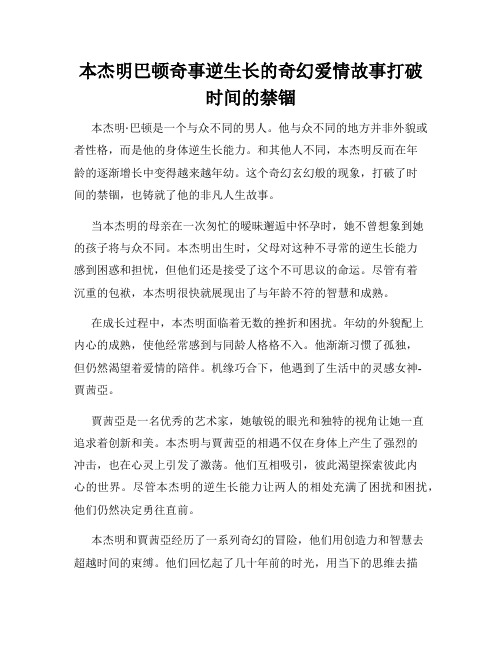
本杰明巴顿奇事逆生长的奇幻爱情故事打破时间的禁锢本杰明·巴顿是一个与众不同的男人。
他与众不同的地方并非外貌或者性格,而是他的身体逆生长能力。
和其他人不同,本杰明反而在年龄的逐渐增长中变得越来越年幼。
这个奇幻玄幻般的现象,打破了时间的禁锢,也铸就了他的非凡人生故事。
当本杰明的母亲在一次匆忙的暧昧邂逅中怀孕时,她不曾想象到她的孩子将与众不同。
本杰明出生时,父母对这种不寻常的逆生长能力感到困惑和担忧,但他们还是接受了这个不可思议的命运。
尽管有着沉重的包袱,本杰明很快就展现出了与年龄不符的智慧和成熟。
在成长过程中,本杰明面临着无数的挫折和困扰。
年幼的外貌配上内心的成熟,使他经常感到与同龄人格格不入。
他渐渐习惯了孤独,但仍然渴望着爱情的陪伴。
机缘巧合下,他遇到了生活中的灵感女神-賈茜亞。
賈茜亞是一名优秀的艺术家,她敏锐的眼光和独特的视角让她一直追求着创新和美。
本杰明与賈茜亞的相遇不仅在身体上产生了强烈的冲击,也在心灵上引发了激荡。
他们互相吸引,彼此渴望探索彼此内心的世界。
尽管本杰明的逆生长能力让两人的相处充满了困扰和困扰,他们仍然决定勇往直前。
本杰明和賈茜亞经历了一系列奇幻的冒险,他们用创造力和智慧去超越时间的束缚。
他们回忆起了几十年前的时光,用当下的思维去描绘未来的梦想。
他们的爱情不仅超越了时间和年龄的限制,也影响了周围的人们。
他们的故事在整个城市传为美谈,成为了人们心中的传奇。
然而,幸福往往伴随着短暂。
本杰明的逆生长一直在发展,而逆生长的速度似乎也在加快。
本杰明意识到他的美好时光即将耗尽,他开始变得渺小而无助。
在舍弃了许多物质和精神的摧残中,他试图抓住生命的最后一丝意义。
在生命走向终点的时刻,本杰明回首过往,触摸着他曾经的幸福和爱情。
他明白,时间和逆生长力量并不是生命中最重要的东西,而是我们与他人之间的情感和羁绊。
他相信,在他消失之后,那些爱过他的人将会怀念他,并且记住他所创造的美好回忆。
本杰明·巴顿奇事逆生长的奇幻爱情故事打破了时间的禁锢,让人们重新思考生命的本质。
浅析菲茨杰拉德短篇小说《本杰明·巴顿奇事》中的魔幻现实主义色彩
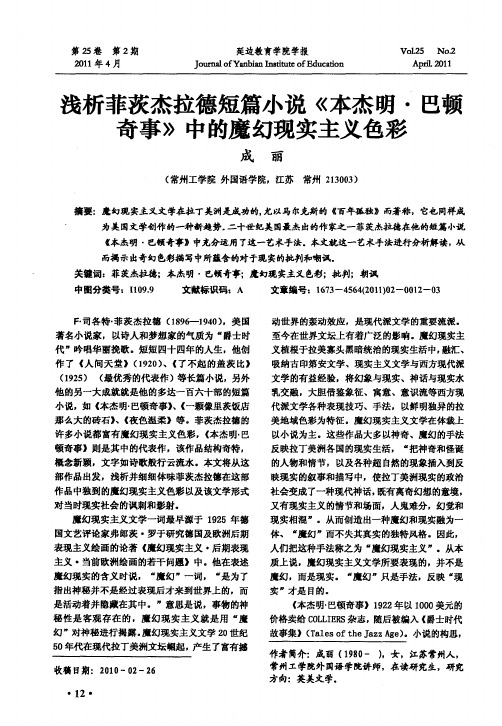
( 常州 工学 院 外国语学院,江苏 常州 2 3 0 ) 1 03
摘要 -魔 幻现 实主义文学在拉 丁美洲是成 功的, 尤以马 尔 克斯 的 《 百年孤独 》而著称 ,它也同样成 为美 国文学创作的一种新趋势. 二十世 纪美国最杰 出的作 家之 一菲茨杰拉德在他的短篇小说 《 本杰明 ・ 巴顿奇事》中充分运用 了这一艺术手 法.本文就这一 艺术手 法进行分析解读 , 从
而揭示出奇幻色彩描写中所蓝含的对于现实的批判和嘲讽. 关键词:菲茨杰拉德;本杰明 ・ 巴顿奇事;魔幻现实主义色彩;批判;朝讽
中图分类号 1I0 . 199 文献标识码:A 文章编号 :l 7 —46 (0 10 —0 1 一O 6 3 5 42 l)2 0 2 3
F司各特 ・ ・ 菲茨 杰拉德 ( 8 6 - 9 0 ,美国 19 - 14 ) 著名小说家 ,以诗人 和梦想家 的气质为 爵士时 代 吟唱华丽挽歌 。短短 四十四年 的人生。他创 作 了 ‘ 间天 堂 >( 9 0 、‘ 人 1 2 ) 了不起 的盖 茨 比’ (9 5 ( 1 2 ) 最优 秀的代表 作)等长篇小说,另外
实 ”才是 目的。
是活动着并 隐藏在 其中 . 意思是说 ,事物 的神
秘 性是 客观 存在 的 ,魔幻 现 实主 义就是 用 。 魔 幻 对神秘进行揭露 。 幻现 实主 义文 学 2 魔 0世纪
‘ 本杰 明・ 巴顿奇事)1 2 以 10 9 2年 0 0美元的 价格卖给 C L IR O L E S杂志,随后被编入 ‘ 爵士时代 故事集 '( a e ft eJ z g ) T l s h a zA e 。小说的构 思, o
根据作者 自己的说法 ,来 自马克 ・ 吐温说 的那句
话 ,人生一大憾事是 其始也至善 ,一 日不如一 日, 至其终则坏无可 坏 。菲茨杰 拉德欲 以虚构之力逆 “ 天命 ”而行 ,想象 唯独有一人 ,降生在正常
The.Curious.Case.of.Benjamin.Button本杰明巴顿奇事,返老还童
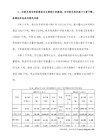
Thomas! 汤马斯!
Thomas, wait! 汤马斯,等等!
Hey, what are you doing there!? What do you have there? 嗨!你去哪里? 你在那儿干嘛呢! 96 00:11:34,489 --> 00:11:36,850 The air is sweet. 外面空气不错
I'm sorry if I offended anybody. 如果冒犯了诸位,我诚心致歉
I hope you enjoy my clock. 我希望你们喜欢我得钟表
Mr Cake was never seen again. 后来凯克先生就音信全无了
Some say he died of a broken heart. 有些人说他死于一颗破碎的心...
Our father was there the day it opened. 建成的那天我得父亲就在那里,
He said that... 他说当时还有个大号团在演奏... 23 00:02:48,791 --> 00:02:51,291 a tuba band was playing.
They had the finest clockmaker in all of the South 整个南部最好的钟表匠造了那台大钟...
Mom, it's not exactly... 妈妈,这本日记不完全是...
Just the sound of your voice, darling. - 听你得声音就足够了... - 好的
It's dated "April 4th, 1985." 这里标记着"1985年四月四日
本杰明·巴顿奇事观后感英文
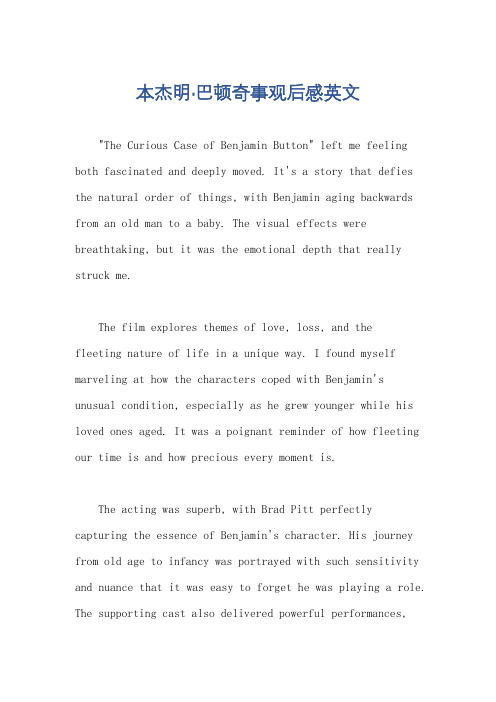
本杰明·巴顿奇事观后感英文"The Curious Case of Benjamin Button" left me feeling both fascinated and deeply moved. It's a story that defies the natural order of things, with Benjamin aging backwards from an old man to a baby. The visual effects were breathtaking, but it was the emotional depth that really struck me.The film explores themes of love, loss, and thefleeting nature of life in a unique way. I found myself marveling at how the characters coped with Benjamin's unusual condition, especially as he grew younger while his loved ones aged. It was a poignant reminder of how fleeting our time is and how precious every moment is.The acting was superb, with Brad Pitt perfectly capturing the essence of Benjamin's character. His journey from old age to infancy was portrayed with such sensitivity and nuance that it was easy to forget he was playing a role. The supporting cast also delivered powerful performances,adding depth and complexity to the story.The music, too, was captivating. It enhanced the emotional impact of the film, making the more tender moments even more heartfelt and the more dramatic scenes even more intense. I found myself lost in the world of "Benjamin Button," forgetting about my own reality for a while.In conclusion, "The Curious Case of Benjamin Button" is a film that stays with you long after the credits roll.It's a thought-provoking and emotionally charged journey that leaves you with a deeper understanding of life and love. It's a must-see for anyone who loves a good story and enjoys being moved by cinema."。
英美文学资料整理

弗朗西斯·斯科特·基·菲茨杰拉德(英语:Francis Scott Key Fitzgerald,1896年9月24日-1940年12月21日),简称斯科特·菲茨杰拉德,是一位美国长篇小说、短篇小说作家,也是20世纪最伟大的美国作家之一。
弗朗西斯·斯科特·基·菲茨杰拉德最著名的小说为《了不起的盖茨比》,此书堪称美国社会缩影的经典代表,描述1920年代美国人在歌舞升平中空虚、享乐、矛盾的精神与思想。
费滋杰罗一生为两样东西所困:一是才华,一是金钱,他都曾一度拥有,最后又全部失去。
他死的时候,评论家都批评他生活腐化、自暴自弃,所以短寿,浪费了自己的才华。
费滋杰罗一生总共写了4部长篇小说,150篇短篇小说。
主要作品:人间天堂the side of paradise 夜色温柔ender is the night 了不起的盖茨比剧本:《美女和被诅咒的人》、《伟大的盖茨比》、《生死同心》、《女人》、《乱世佳人》、《居里夫人》、《夜色温柔》《我最后一次见到巴黎》、《绮梦初艳》等长篇小说:《人间天堂》(1920)、《美丽与毁灭》(1922)、《了不起的盖茨比》(1925)、《夜色温柔》(1934)、《最后一个大亨》(1941)等短篇小说:《本杰明·巴顿奇事》(《返老还童》)《冰宫》《冬天的梦》《赦免》《明智之事》、《伯妮斯理发》《水果软糖》《梦幻的残片》《重返巴比伦》《富家子弟》《宝贝派对》《最后一个南方女郎》《魅力》《骆驼的背脊》《哦,红发女巫》《残火》等短篇小说集:《飞女郎与哲学家》(1920)、《爵士时代的故事》(1922)《那些忧伤的年轻人》(1926)、《早晨的起床号》(1935)等[1]时代与创作:美国历史上一个特殊的年代。
“这是一个奇迹的时代,一个艺术的时代,一个挥金如土的时代,也是一个充满嘲讽的时代。
”菲茨杰拉德称这个时代为“爵士乐时代”,他自己也因此被称为爵士乐时代的“编年史家”和“桂冠诗人”。
《 本杰明·巴顿奇事》的魔幻现实主

| 海外艺术25《本杰明·巴顿奇事》的魔幻现实主义解读□李恩临/文菲茨杰拉德是享有国际声誉的美国作家,是“迷惘的一代”的代言人,他的作品形象地再现了美国“爵士乐”时代人们的现实生活。
《本杰明·巴顿奇事》是其中富有魔幻现实主义色彩的代表作,展现了主人公不断倒行的人生,他的魔幻命运中融入了菲茨杰拉德对整个爵士乐时代的观察和思考。
文章从魔幻现实主义的人物塑造、写作技巧和叙事特征对小说进行文本分析,揭示出奇幻描写中对现实的嘲讽与批判。
虽然拉美文学开创了魔幻现实主义小说的先河,但这种以魔幻手法表达社会现实,揭露社会弊端的文学现象为美国文学创作开辟了新趋势。
《本杰明·巴顿奇事》是菲茨杰拉德160余篇短篇小说之中充满魔幻现实主义色彩的一部作品,讲述了主人公本杰明不断倒行的一生[1]。
生理和心理的逆生长使他受尽了冷漠和歧视。
虽然他在中年时期取得了短暂的成功,但他魔幻的命运也使他注定与亲情、爱情、友情渐行渐远。
他的内心逐渐空虚与落寞,最终以一个婴儿的样貌在襁褓中死去。
菲茨杰拉德用自己丰富的想象力塑造了主人公与众不同的生命轨迹,使读者体会到非凡的情感,反映了现实生活中人性的本质和内涵。
1 魔幻现实主义的人物塑造菲茨杰拉德对本杰明的人物形象进行了细致描写,使人物特征具有神秘性、人物关系具有特殊性,反映了美国一战后社会中异化的人际关系。
菲茨杰拉德笔下的本杰明在人物特征上具有神秘性。
他一出生就是70岁老人的模样,比普通的婴儿大一些,头发稀疏花白,下巴上长着一撮小胡子,驼着背,皮肤皱巴巴的,眼神浑浊而且呆滞[2]。
每过一段时间他都会比之前更年轻一些,身体也越来越强壮。
这样不断逆生长的发育方式与正常人相反,特殊的生长命运给主人公披上了一层神秘的面纱,使读者好奇主人公的奇特遭遇。
不仅如此,本杰明在行为上也与其他人不同。
刚出生时,他便会与人交流,向医生护士表达他的不满。
他不想躺在婴儿床上,反倒喜欢老年人才喜欢的躺椅。
- 1、下载文档前请自行甄别文档内容的完整性,平台不提供额外的编辑、内容补充、找答案等附加服务。
- 2、"仅部分预览"的文档,不可在线预览部分如存在完整性等问题,可反馈申请退款(可完整预览的文档不适用该条件!)。
- 3、如文档侵犯您的权益,请联系客服反馈,我们会尽快为您处理(人工客服工作时间:9:00-18:30)。
【《TXT论坛》 ,欢迎您来TXTBBS推荐好书!】;Curious Case of Benjamin ButtonIAs long ago as 1860 it was the proper thing to be born at home. Atpresent, so I am told, the high gods of medicine have decreed that thefirst cries of the young shall be uttered upon the anaesthetic air ofa hospital, preferably a fashionable one. So young Mr. and Mrs. RogerButton were fifty years ahead of style when they decided, one day inthe summer of 1860, that their first baby should be born in ahospital. Whether this anachronism had any bearing upon theastonishing history I am about to set down will never be known.I shall tell you what occurred, and let you judge for yourself.The Roger Buttons held an enviable position, both social andfinancial, in ante-bellum Baltimore. They were related to the ThisFamily and the That Family, which, as every Southerner knew, entitledthem to membership in that enormous peerage which largely populatedthe Confederacy. This was their first experience with the charming oldcustom of having babies--Mr. Button was naturally nervous. He hoped itwould be a boy so that he could be sent to Yale College inConnecticut, at which institution Mr. Button himself had been knownfor four years by the somewhat obvious nickname of "Cuff."On the September morning consecrated to the enormous event he arosenervously at six o'clock dressed himself, adjusted an impeccablestock, and hurried forth through the streets of Baltimore to thehospital, to determine whether the darkness of the night had borne innew life upon its bosom. When he was approximately a hundred yards from the Maryland PrivateHospital for Ladies and Gentlemen he saw Doctor Keene, the familyphysician, descending the front steps, rubbing his hands together witha washing movement--as all doctors are required to do by the unwrittenethics of their profession.Mr. Roger Button, the president of Roger Button & Co., WholesaleHardware, began to run toward Doctor Keene with much less dignity thanwas expected from a Southern gentleman of that picturesque period."Doctor Keene!" he called. "Oh, Doctor Keene!"The doctor heard him, faced around, and stood waiting, a curiousexpression settling on his harsh, medicinal face as Mr. Button drewnear."What happened?" demanded Mr. Button, as he came up in a gasping rush."What was it? How is she" A boy? Who is it? What---""Talk sense!" said Doctor Keene sharply, He appeared somewhatirritated."Is the child born?" begged Mr. Button.Doctor Keene frowned. "Why, yes, I suppose so--after a fashion." Againhe threw a curious glance at Mr. Button."Is my wife all right?""Yes.""Is it a boy or a girl?""Here now!" cried Doctor Keene in a perfect passion of irritation,"I'll ask you to go and see for yourself. Outrageous!" He snapped thelast word out in almost one syllable, then he turned away muttering:"Do you imagine a case like this will help my professional reputation?One more would ruin me--ruin anybody.""What's the matter?" demanded Mr. Button appalled. "Triplets?""No, not triplets!" answered the doctor cuttingly. "What's more, youcan go and see for yourself.And get another doctor. I brought youinto the world, young man, and I've been physician to your family forforty years, but I'm through with you! I don't want to see you or anyof your relatives ever again! Good-bye!"Then he turned sharply, and without another word climbed into hisphaeton, which was waiting at the curbstone, and drove severely away.Mr. Button stood there upon the sidewalk, stupefied and trembling fromhead to foot. What horrible mishap had occurred? He had suddenly lostall desire to go into the Maryland Private Hospital for Ladies andGentlemen--it was with the greatest difficulty that, a moment later,he forced himself to mount the steps and enter the front door.A nurse was sitting behind a desk in the opaque gloom of the hall.Swallowing his shame, Mr. Button approached her."Good-morning," she remarked, looking up at him pleasantly."Good-morning. I--I am Mr. Button."At this a look of utter terror spread itself over girl's face. Sherose to her feet and seemed about to fly from the hall, restrainingherself only with the most apparent difficulty."I want to see my child," said Mr. Button.The nurse gave a little scream. "Oh--of course!" she criedhysterically. "Upstairs. Right upstairs. Go--_up!_"She pointed the direction, and Mr. Button, bathed in coolperspiration, turned falteringly, and began to mount to the secondfloor. In the upper hall he addressed another nurse who approachedhim, basin in hand. "I'm Mr. Button," he managed to articulate. "Iwant to see my----"Clank! The basin clattered to the floor and rolled in the direction ofthe stairs. Clank! Clank! I began a methodical decent as if sharing inthe general terror which this gentleman provoked."I want to see my child!" Mr. Button almost shrieked. He was on theverge of collapse.Clank! The basin reached the first floor. The nurse regained controlof herself, and threw Mr. Button a look of hearty contempt."All _right_, Mr. Button," she agreed in a hushed voice. "Very_well!_ But if you _knew_ what a state it's put us all in thismorning! It's perfectly outrageous! The hospital will never havea ghost of a reputation after----""Hurry!" he cried hoarsely. "I can't stand this!""Come this way, then, Mr. Button."He dragged himself after her. At the end of a long hall they reached aroom from which proceeded a variety of howls--indeed, a room which, inlater parlance, would have been known as the "crying-room." Theyentered."Well," gasped Mr. Button, "which is mine?""There!" said the nurse.Mr. Button's eyes followed her pointing finger, and this is what hesaw. Wrapped in a voluminous white blanket, and partly crammed intoone of the cribs, there sat an old man apparently about seventy yearsof age. His sparse hair was almost white, and from his chin dripped along smoke-coloured beard, which waved absurdly back and forth, fannedby the breeze coming in at the window. He looked up at Mr. Button withdim, faded eyes in which lurked a puzzled question. "Am I mad?" thundered Mr. Button, his terror resolving into rage. "Isthis some ghastly hospital joke?"It doesn't seem like a joke to us," replied the nurse severely. "AndI don't know whether you'remad or not--but that is most certainlyyour child."The cool perspiration redoubled on Mr. Button's forehead. He closedhis eyes, and then, opening them, looked again. There was nomistake--he was gazing at a man of threescore and ten--a _baby_of threescore and ten, a baby whose feet hung over the sides of thecrib in which it was reposing.The old man looked placidly from one to the other for a moment, andthen suddenly spoke in a cracked and ancient voice. "Are you myfather?" he demanded.Mr. Button and the nurse started violently."Because if you are," went on the old man querulously, "I wish you'dget me out of this place--or, at least, get them to put a comfortablerocker in here,""Where in God's name did you come from? Who are you?" burst out Mr.Button frantically."I can't tell you _exactly_ who I am," replied the querulouswhine, "because I've only been born a few hours--but my last name iscertainly Button.""You lie! You're an impostor!"The old man turned wearily to the nurse. "Nice way to welcome anew-born child," he complained in a weak voice. "Tell him he's wrong,why don't you?""You're wrong. Mr. Button," said the nurse severely. "This is yourchild, and you'll have to make the best of it. We're going to ask youto take him home with you as soon as possible-some time to-day.""Home?" repeated Mr. Button incredulously."Yes, we can't have him here. We really can't, you know?""I'm right glad of it," whined the old man. "This is a fine place tokeep a youngster of quiet tastes. With all this yelling and howling, Ihaven't been able to get a wink of sleep. I asked for something toeat"--here his voice rose to a shrill note of protest--"and theybrought me a bottle of milk!"Mr. Button, sank down upon a chair near his son and concealed his facein his hands. "My heavens!" he murmured, in an ecstasy of horror."What will people say? What must I do?""You'll have to take him home," insisted the nurse--"immediately!"A grotesque picture formed itself with dreadful clarity before theeyes of the tortured man--a picture of himself walking through thecrowded streets of the city with this appalling apparition stalking byhis side."I can't. I can't," he moaned.People would stop to speak to him, and what was he going to say? Hewould have to introduce this--this septuagenarian: "This is my son,born early this morning." And then the old man would gather hisblanket around him and they would plod on, past the bustling stores,the slave market--for a dark instant Mr. Button wished passionatelythat his son was black--past the luxurious houses of the residentialdistrict, past the home for the aged...."Come! Pull yourself together," commanded the nurse."See here," the old man announced suddenly, "if you think I'm going towalk home in this blanket, you're entirely mistaken.""Babies always have blankets."With a malicious crackle the old man held up a small white swaddlinggarment. "Look!" he quavered. "_This_ is what they had ready forme.""Babies always wear those," said the nurse primly."Well," said the old man, "this baby's not going to wear anything inabout two minutes. Thisblanket itches. They might at least have givenme a sheet.""Keep it on! Keep it on!" said Mr. Button hurriedly. He turned to thenurse. "What'll I do?""Go down town and buy your son some clothes."Mr. Button's son's voice followed him down into the: hall: "And acane, father. I want to have a cane."Mr. Button banged the outer door savagely....2"Good-morning," Mr. Button said nervously, to the clerk in theChesapeake Dry Goods Company. "I want to buy some clothes for mychild.""How old is your child, sir?""About six hours," answered Mr. Button, without due consideration."Babies' supply department in the rear.""Why, I don't think--I'm not sure that's what I want. It's--he's anunusually large-size child. Exceptionally--ah large.""They have the largest child's sizes.""Where is the boys' department?" inquired Mr. Button, shifting hisground desperately. He felt that the clerk must surely scent hisshameful secret."Right here.""Well----" He hesitated. The notion of dressing his son in men'sclothes was repugnant to him. If, say, he could only find a very largeboy's suit, he might cut off that long and awful beard, dye the whitehair brown, and thus manage to conceal the worst, and to retainsomething of his own self-respect--not to mention his position inBaltimore society.But a frantic inspection of the boys' department revealed no suits tofit the new-born Button. He blamed the store, of course---in suchcases it is the thing to blame the store."How old did you say that boy of yours was?" demanded the clerkcuriously."He's--sixteen.""Oh, I beg your pardon. I thought you said six _hours_. You'llfind the youths' department in the next aisle."Mr. Button turned miserably away. Then he stopped, brightened, andpointed his finger toward a dressed dummy in the window display."There!" he exclaimed. "I'll take that suit, out there on the dummy."The clerk stared. "Why," he protested, "that's not a child's suit. Atleast it _is_, but it's for fancy dress. You could wear ityourself!""Wrap it up," insisted his customer nervously. "That's what I want."The astonished clerk obeyed.Back at the hospital Mr. Button entered the nursery and almost threwthe package at his son. "Here's your clothes," he snapped out.The old man untied the package and viewed the contents with aquizzical eye."They look sort of funny to me," he complained, "I don't want to bemade a monkey of--""You've made a monkey of me!" retorted Mr. Button fiercely. "Never youmind how funny you look. Put them on--or I'll--or I'll _spank_you." He swallowed uneasily at the penultimate word, feelingnevertheless that it was the proper thing to say."All right, father"--this with a grotesque simulation of filialrespect--"you've lived longer; you know best. Just as you say."As before, the sound of the word "father" caused Mr. Button to startviolently."And hurry.""I'm hurrying, father."When his son was dressed Mr. Button regarded him with depression. Thecostume consisted of dotted socks, pink pants, and a belted blousewith a wide white collar. Over the latter waved the long whitishbeard, drooping almost to the waist. The effect was not good."Wait!"Mr. Button seized a hospital shears and with three quick snapsamputated a large section of the beard. But even with this improvementthe ensemble fell far short of perfection. The remaining brush ofscraggly hair, the watery eyes, the ancient teeth, seemed oddly out oftone with the gaiety of the costume. Mr. Button, however, wasobdurate--he held out his hand. "Come along!" he said sternly.His son took the hand trustingly. "What are you going to call me,dad?" he quavered as they walked from the nursery--"just 'baby' for awhile? till you think of a better name?"Mr. Button grunted. "I don't know," he answered harshly. "I thinkwe'll call you Methuselah."3Even after the new addition to the Button family had had his hair cutshort and then dyed to a sparse unnatural black, had had his faceshaved so dose that it glistened, and had been attired in small-boyclothes made to order by a flabbergasted tailor, it was impossible forButton to ignore the fact that his son was a excuse for a first familybaby. Despite his aged stoop, Benjamin Button--for it was by this namethey called him instead of by the appropriate but invidiousMethuselah--was five feet eight inches tall. His clothes did notconceal this, nor did the clipping and dyeing of his eyebrows disguisethe fact that the eyes under--were faded and watery and tired. Infact, the baby-nurse who had been engaged in advance left the houseafter one look, in a state of considerable indignation.But Mr. Button persisted in his unwavering purpose. Benjamin was ababy, and a baby he should remain. At first he declared that ifBenjamin didn't like warm milk he could go without food altogether,but he was finally prevailed upon to allow his son bread and butter,and even oatmeal by way of a compromise. One day he brought home arattle and, giving it to Benjamin, insisted in no uncertain terms thathe should "play with it," whereupon the old man took it with--a wearyexpression and could be heard jingling it obediently at intervalsthroughout the day.There can be no doubt, though, that the rattle bored him, and that hefound other and more soothing amusements when he was left alone. Forinstance, Mr. Button discovered one day that during the preceding weekbe had smoked more cigars than ever before--a phenomenon, which wasexplained a few days later when, entering the nursery unexpectedly, hefound the room full of faint blue haze and Benjamin, with a guiltyexpression on his face, trying to conceal the butt of a dark Havana.This, of course, called for a severe spanking, but Mr. Button foundthat he could not bring himself to administer it. He merely warned hisson that he would "stunt his growth." Nevertheless he persisted in his attitude. He brought home leadsoldiers, he brought toy trains, he brought large pleasant animalsmade of cotton, and, to perfect the illusion which he wascreating--for himself at least--he passionately demanded of the clerkin the toy-store whether "the paint would come oft the pink duck ifthe baby put it in his mouth." But, despite all his father's efforts,Benjamin refused to be interested. He would steal down the back stairsand return to the nursery with a volume of the EncyclopediaBritannica, over which he would pore through anafternoon, while hiscotton cows and his Noah's ark were left neglected on the floor.Against such a stubbornness Mr. Button's efforts were of little avail.The sensation created in Baltimore was, at first, prodigious. What themishap would have cost the Buttons and their kinsfolk socially cannotbe determined, for the outbreak of the Civil War drew the city'sattention to other things. A few people who were unfailingly politeracked their brains for compliments to give to the parents--andfinally hit upon the ingenious device of declaring that the babyresembled his grandfather, a fact which, due to the standard state ofdecay common to all men of seventy, could not be denied. Mr. and Mrs.Roger Button were not pleased, and Benjamin's grandfather wasfuriously insulted.Benjamin, once he left the hospital, took life as he found it. Severalsmall boys were brought to see him, and he spent a stiff-jointedafternoon trying to work up an interest in tops and marbles--he evenmanaged, quite accidentally, to break a kitchen window with a stonefrom a sling shot, a feat which secretly delighted his father.Thereafter Benjamin contrived to break something every day, but he didthese things only because they were expected of him, and because hewas by nature obliging.When his grandfather's initial antagonism wore off, Benjamin and thatgentleman took enormous pleasure in one another's company. They wouldsit for hours, these two, so far apart in age and experience, and,like old cronies, discuss with tireless monotony the slow events ofthe day. Benjamin felt more at ease in his grandfather's presence thanin his parents'--they seemed always somewhat in awe of him and,despite the dictatorial authority they exercised over him, frequentlyaddressed him as "Mr."He was as puzzled as any one else at the apparently advanced age ofhis mind and body at birth. He read up on it in the medical journal,but found that no such case had been previously recorded. At hisfather's urging he made an honest attempt to play with other boys, andfrequently he joined in the milder games--football shook him up toomuch, and he feared that in case of a fracture his ancient bones wouldrefuse to knit.When he was five he was sent to kindergarten, where he initiated intothe art of pasting green paper on orange paper, of weaving colouredmaps and manufacturing eternal cardboard necklaces. He was inclined todrowse off to sleep in the middle of these tasks, a habit which bothirritated and frightened his young teacher. To his relief shecomplained to his parents, and he was removed from the school. TheRoger Buttons told their friends that they felt he was too young.By the time he was twelve years old his parents had grown used to him.Indeed, so strong is the force of custom that they no longer felt thathe was different from any other child--except when some curiousanomaly reminded them of the fact. But one day a few weeks after histwelfth birthday, while looking in the mirror, Benjamin made, orthought he made, an astonishing discovery. Did his eyes deceive him,or had his hair turned in the dozen years of his life from white toiron-gray under its concealing dye? Was the network of wrinkles on hisface becoming less pronounced? Was his skin healthier and firmer, witheven a touch of ruddy winter colour? He could not tell. He knew thathe no longer stooped, and that his physical condition had improvedsince the early days of his life."Can it be----?" he thought to himself, or, rather, scarcely dared tothink.He went to his father. "I am grown," he announced determinedly. "Iwant to put on long trousers." His father hesitated. "Well," he said finally, "I don't know. Fourteenis the age for putting on long trousers--and you are only twelve.""But you'll have to admit," protested Benjamin, "that I'm big for myage."His father looked at him with illusory speculation. "Oh, I'm not sosure of that," he said. "I was as big as you when I was twelve."This was not true-it was all part of Roger Button's silent agreementwith himself to believe in his son's normality.Finally a compromise was reached. Benjamin was to continue to dye hishair. He was to make a better attempt to play with boys of his ownage. He was not to wear his spectacles or carry a cane in the street.In return for these concessions he was allowed his first suit of longtrousers....4Of the life of Benjamin Button between his twelfth and twenty-firstyear I intend to say little. Suffice to record that they were years ofnormal ungrowth. When Benjamin was eighteen he was erect as a man offifty; he had more hair and it was of a dark gray; his step was firm,his voice had lost its cracked quaver and descended to a healthybaritone. So his father sent him up to Connecticut to takeexaminations for entrance to Yale College. Benjamin passed hisexamination and became a member of the freshman class.On the third day following his matriculation he received anotification from Mr. Hart, the college registrar, to call at hisoffice and arrange his schedule. Benjamin, glancing in the mirror,decided that his hair needed a new application of its brown dye, butan anxious inspection of his bureau drawer disclosed that the dyebottle was not there. Then he remembered--he had emptied it the daybefore and thrown it away.He was in a dilemma. He was due at the registrar's in five minutes.There seemed to be no help for it--he must go as he was. He did."Good-morning," said the registrar politely. "You've come to inquireabout your son.""Why, as a matter of fact, my name's Button----" began Benjamin, butMr. Hart cut him off."I'm very glad to meet you, Mr. Button. I'm expecting your son hereany minute.""That's me!" burst out Benjamin. "I'm a freshman.""What!""I'm a freshman.""Surely you're joking.""Not at all."The registrar frowned and glanced at a card before him. "Why, I haveMr. Benjamin Button's age down here as eighteen.""That's my age," asserted Benjamin, flushing slightly.The registrar eyed him wearily. "Now surely, Mr. Button, you don'texpect me to believe that." Benjamin smiled wearily. "I am eighteen," he repeated.The registrar pointed sternly to the door. "Get out," he said. "Getout of college and get out of town. You are a dangerous lunatic.""I am eighteen."Mr. Hart opened the door. "The idea!" he shouted. "A man of your agetrying to enter here as a freshman. Eighteen years old, are you? Well,I'll give you eighteen minutes to get out of town." Benjamin Button walked with dignity from the room, and half a dozenundergraduates, who were waiting in the hall, followed him curiouslywith their eyes. When he had gone a little way he turned around, facedthe infuriated registrar, who was still standing in the door-way, andrepeated in a firm voice: "I am eighteen years old."To a chorus of titters which went up from the group of undergraduates,Benjamin walked away. But he was not fated to escape so easily. On his melancholy walk tothe railroad station he found that he was being followed by a group,then by a swarm, and finally by a dense mass of undergraduates. Theword had gone around that a lunatic had passed the entranceexaminations for Yale and attempted to palm himself off as a youth ofeighteen. A fever of excitement permeated the college. Men ran hatlessout of classes, the football team abandoned its practice and joinedthe mob, professors' wives with bonnets awry and bustles out ofposition, ran shouting after the procession, from which proceeded acontinual succession of remarks aimed at the tender sensibilities ofBenjamin Button."He must be the wandering Jew!""He ought to go to prep school at his age!""Look at the infant prodigy!" "He thought this was the old men'shome.""Go up to Harvard!"Benjamin increased his gait, and soon he was running. He would showthem! He _would_ go to Harvard, and then they would regret theseill-considered taunts!Safely on board the train for Baltimore, he put his head from thewindow. "You'll regret this!" he shouted."Ha-ha!" the undergraduates laughed. "Ha-ha-ha!" It was the biggestmistake that Yale College had ever made....5In 1880 Benjamin Button was twenty years old, and he signalised hisbirthday by going to work for his father in Roger Button & Co.,Wholesale Hardware. It was in that same year that he began "going outsocially"--that is, his father insisted on taking him to severalfashionable dances. Roger Button was now fifty, and he and his sonwere more and more companionable--in fact, since Benjamin had ceasedto dye his hair (which was still grayish) they appeared about the sameage, and could have passed for brothers.One night in August they got into the phaeton attired in theirfull-dress suits and drove out to a dance at the Shevlins' countryhouse, situated just outside of Baltimore. It was a gorgeous evening.A full moon drenched the road to the lustreless colour of platinum,and late-blooming harvest flowers breathed into the motionless airaromas that were like low, half-heard laughter. The open country,carpeted for rods around with bright wheat, was translucent as in theday. It was almost impossible not to be affected by the sheer beautyof the sky--almost."There's a great future in the dry-goods business," Roger Button wassaying. He was not a spiritual man--his aesthetic sense wasrudimentary."Old fellows like me can't learn new tricks," he observed profoundly."It's you youngsters with energy and vitality that have the greatfuture before you."Far up the road the lights of the Shevlins' country house drifted intoview, and presently there was a sighing sound that crept persistentlytoward them--it might have been the fine plaint of violins or therustle of the silver wheat under the moon.They pulled up behind a handsome brougham whose passengers weredisembarking at the door. A lady got out, then an elderly gentleman,then another young lady, beautiful as sin. Benjamin started; an almostchemical change seemed to dissolve and recompose the very elements ofhis body. A rigour passed over him, blood rose into his cheeks, hisforehead, and there was a steady thumping in his ears. It was firstlove.。
